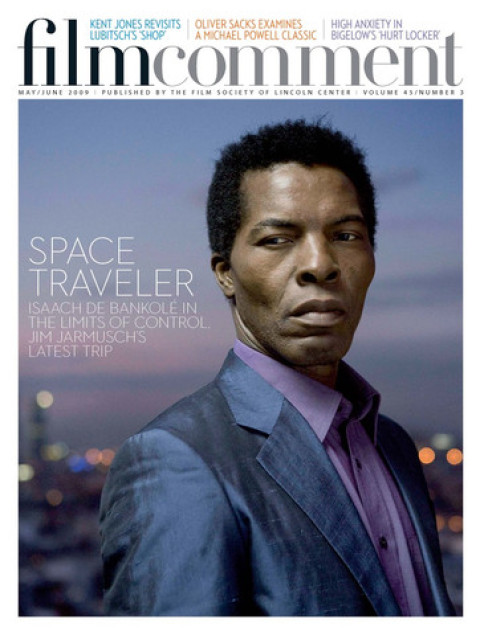
First let’s consider the poster. John Krasinski and Maya Rudolph, in walk-and-talk formation, superimposed onto the soft poetics of a colored pencil illustration. Krasinski looks easygoing and affable, wearing a green army jacket and sporting a beard and glasses. Maya Rudolph is pregnant and glancing lovingly at her “good guy.” There’s an element of wonder and fantasy. A car winding down a road. Rain falling from a pastel cloud. An orange tree. An airplane. And in the middle, between the young couple, the sun casting its rays over a house. As you pass by, the poster cries out: Hey you! Yeah you! You liberal? You have a Marcel Dzama monograph on your coffee table? A bottle of Yellow Tail in your fridge? You’re too sophisticated for Seth Rogen? You have priorities? What? Oh, and you’re starting a family too? You’ve MapQuested Park Slope and you’re wondering what the hell is going on? Well then come on in, this is your film.
And hell, the poster might be right. A road movie, bourgeois comedy, pull-at-your-heartstrings drama, Away We Go follows thirtysomething couple Burt (Krasinski) and Verona (Rudolph) on a tour of the U.S. (and Montreal) in search of a place to start a home with their forthcoming first child. Along the way the baffled wayward couple comes into contact with friends and relatives, who together represent a cross-section of family archetypes; the middle-American casualty family (fat kids, crass parents), the New Age neo-hippy family (they make love in front of their child); the “adopted because they can’t have their own kids” family (desperate, secretly unhappy); and the single-dad family (deterministic, anxiety-ridden). As for Burt and Verona, they haven’t found their archetype yet. Verona won’t marry Burt, even though Burt keeps asking. Having lost her parents when she was in college, Verona doesn’t see the point in tying the knot with a formal ceremony. But judging by where the road is leading, you can be sure the destination won’t be too unconventional.

Director Sam Mendes and screenwriters Dave Eggers and Vendela Vida have skillfully smuggled an almost sentimental hope for the renewal of good old American family values under the guise of a hip comedy that depends on the dysfunctionality of these very values for its laughs. The setups hint at the search for an alternative. Burt and Verona are an interracial couple, they are having a child out of wedlock, they drive a Volvo and are on a road trip—but that’s as far as it goes. Burt is smart enough to be able ask himself why he has to be so “startled, confused, immature, American,” but the filmmakers seem to answer that there’s no other way to keep him a likeable everyman. Best to stick to traditions.
It’s to the main actors’ credit that they retain their authenticity amidst all these well-cast but cartoonishly drawn cutouts. Then again, perhaps Mendes’s point was to throw Burt and Verona into relief by making everyone else a little ridiculous, in which case it worked. Krasinski’s “baby stroller blow-up” is acted with genuine anarchic spirit, and Rudolph gets a nice monologue under an orange tree toward the film’s end. Each destination on the trip is separated by big white-on-black intertitles stating the next stop, and the film seems to progress with an equal measure of bathos and pathos. The more the tragicomic debris of contemporary family life piles up around the couple, the more they pause to reflect on the meaning of “family.” (Cue the rueful acoustic guitar music.) Those curious about Dave Eggers’s dialogue can expect lines like, “Drought’s coming, like a biblical flood but in reverse. Golf course will be the first to go.” I won’t give away the ending, but let’s just say it returns us to the element of wonder and fantasy forecasted by the film’s poster.








